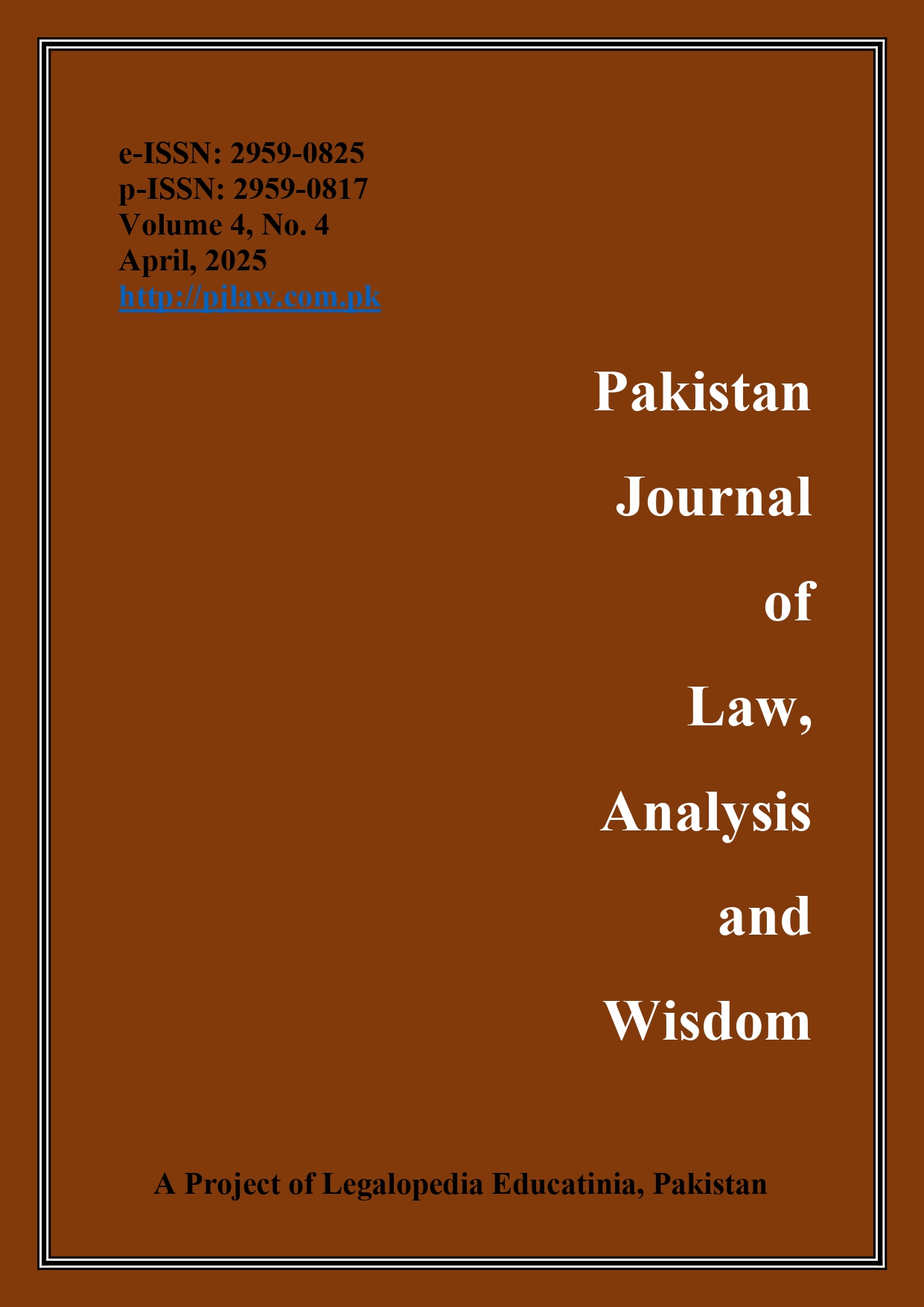Unveiling Legal Hurdles: The Roadblocks to Justice for Acid Attack Survivors
Keywords:
Acid Violence, Gender-Based Violence, Socio-legal Obstacles, Legislative ReformAbstract
Acid attack violence is a form of violence that asymmetrically target female population. in spite of legislation reforms like acid control and acid crime prevention act of 2011 and the acid and burn crime act of 2018, this deliberate act of violence has crossed the socio legal restrains. The study aimed at probing through the systematic impediments which hinder acid attack survivors’ access to justice in Pakistan. The study also evaluates the strength of current acid legislation in reaching their needs. Furthermore, the study also targeted the socio legal barriers faced by acid victims along with the recommendations of practical action plan for policy reforms. A qualitative style of research along with a phenomenological approach targeted 25 acid attack survivors from Punjab, Pakistan. Semi structured interviews were conducted with the participants selected via purposive sampling to collect data. prominent obstacles were identified through thematic analysis. Lack of awareness among victims, systematic corruption, incompetent police role, powerful perpetrator’s, including upscaled legal procedures. The findings identified extended shortcomings in Pakistan’s judicial system and loopholes like inefficiency and corrupt institutional support. Through interviews it has been found that many survivors were negligent of their legal rights. Moreover, intricate legal procedures further delayed their access to justice. Preparator’s overpowering effect further exploited the evidence. Patriarchal canopy over arched the socio-economic inequalities and gender bases violence. To address this concern the study proposed to simplify the proceedings of legal procedures, educating about acid related laws, taking anti-corruption measures to reinforce lawfulness while establishing strict acid laws. Moreover, sustaining special courts, ensuring free legal assistance, and advocating gender equality were significant measures proposed to maintain justice. Alliance with international organization may further advocate survivors’ access to justice and accurate policy reforms on grass root level. The study compels on the fact that elimination of systematic in competences and reforming social norms may eliminate acid violence in Pakistan.
References
Abouzeid, R. (2010, March 11). Pakistan's acid-attack victims fight back. https://content.time.com/time/world/article/0,8599,1971124,00.html
Acid Survivors Foundation, Pakistan. (2017). Report: “Countering acid burn violence in Pakistan: A success story.
Acid Survivors Foundation. (2010). Annual Report.
Acid Survivors Foundation. (2015, September). Acid violence in Pakistan: A situational analysis.
Acid Survivors Foundation. (2022, December).
Acid Attack Statistics 1999-2022.
https://acidsurvivors.org/wp-content/uploads/2023/03/Statistics-27.3.2023.pdf
Acid Survivors Foundation. (n.d.). Acid Attack Statistics.
Acid Survivors Trust International. (2016). Survivor stories: Naieema, Pakistan.
http://www.acidviolence.org/index.php/survivors/stories/naieema/pakistan
Acid Survivors Trust International. (2018). Acid Attack Statistics Pakistan. https://www.asti.org.uk/a-worldwide-problem.html
Agha, N., & Ahmed, Z. (2018). Prevalence and nature of violence against women in Pakistan: A six-month content analysis of a Pakistani newspaper. Pakistan Journal of Criminology, 10(1), 100-120.
Anwary, A. (2003). Acid violence and medical care in Bangladesh: Women’s activism as care work. Gender & Society, 17(2), 305-313.
Bari, O. M. (2015). Delayed justice and its impact on human rights in Pakistan. University college Lahore human rights review, 3. https://humanrightsreviewpakistan.wordpress.com/volume-iii/delayed-justice-andits-impact-on-human-rights-in-pakistan/
Chowdhury, E. H. (2007). Negotiating state and NGO politics in Bangladesh. Violence Against Women, 13(8), 857-873. https://doi.org/10.1177/1077801207302046
Jamshed, Jibran. (2018). Corruption in Pakistan Police. https://www.researchgate.net/publication/325287443_Corruption_in_Pakistan_Police
Kamruzzaman, Md., & Hakim, Md. A. (2016). Prevalence of Acid Crime Victimization in South Asia: A Review. Journal of biological and environmental engineering, 1(2), 17-22. https://www.researchgate.net/publication/318848246_Prevalence_of_Acid_Crime_Victimization_in_South_Asia_A_Review
Khan, A., & Hussain, R. (2008). Violence against women in Pakistan: Perceptions and experiences of domestic violence. Asian Studies Review, 32(2), 239-253.
Mannan, A.; S. Ghani; A. Clarke; P. White; S. Salmanta; P.E.M. Butler (August 2005). "Psychosocial outcomes derived from an acid burned population in Bangladesh, and comparison with Western norms". Burns 32 (2): 235–241.
Menon, P., & Vashishtha, S. (2013). Vitriolage & India - The modern weapon of revenge. International Journal of Humanities and Social Science Invention, 2(10), 1-09. http://www.ijhssi.org/papers/v2(10)/ Version-2/A0210020109.pdf
Mujeeb, A., & Kamal, A. (2018). Interpersonal relationships, psychological effects, and coping strategies among acid burn female victims. Pakistan Journal of Psychological Research, 33(2), 575-590.
Naqvi, H. (2014, June 06). Burning issue: ‘Over 50% acid attacks in Pakistan occur in Punjab’. The Express Tribune.
Patel, M. (2014). A Desire to Disfigure: Acid Attack in India. International Journal of Criminology and Sociological Theory, Vol. 7,2, 11.
Patel, R. (2010). Gender equality and women's empowerment in Pakistan. Pakistan: Oxford University Press
Raj, A., & Silverman, J. (2002). Violence against immigrant women: the role of culture, context, and legal immigrant status on intimate partner violence. Violence Against Women, 8, 367-398.
Social Policy and Development Center. (2012). The Socio-economic cost of violence against women: A Case study of Karachi (Report 5). Karachi: The Times Press Pvt Limited.
Solberg, K. (2010). Pakistan moves to tackle acid violence. The Lancet, 376(9748), 1209-1210.
Saeed, M. (2017). Acid crimes in Pakistan. Human Right Commission of Pakistan. https://hrcp-web.org/hrcpweb/wp-content/uploads/2020/09/Acid-crimes-in-Pakistan.pdf
United Nations. General Assembly. (1993). Draft declaration on the elimination of violence against women. https://www.ohchr.org/en/instruments-mechanisms/instruments/declaration-elimination-violence-against-women
Yasmeen, M. N. (2015). Acid attack in the back drop of India and Criminal Amendment ,Act, 2013. International Journal of Humanities and Social Science Invention.
Zia, T. (2013). Acid violence in Pakistan. UCLA Center for the study of women: https://escholarship.org/uc/item/65v958z1
Downloads
Published
Issue
Section
License
Copyright (c) 2025 Dr. Beenish Ambereen, Ms. Shanzay Ishfaq, Dr Amna Afzaal, Ms. Memoona Noor

This work is licensed under a Creative Commons Attribution-NonCommercial 4.0 International License.











 LEGALOPEDIA EDUCATINIA (PVT) LTD
LEGALOPEDIA EDUCATINIA (PVT) LTD